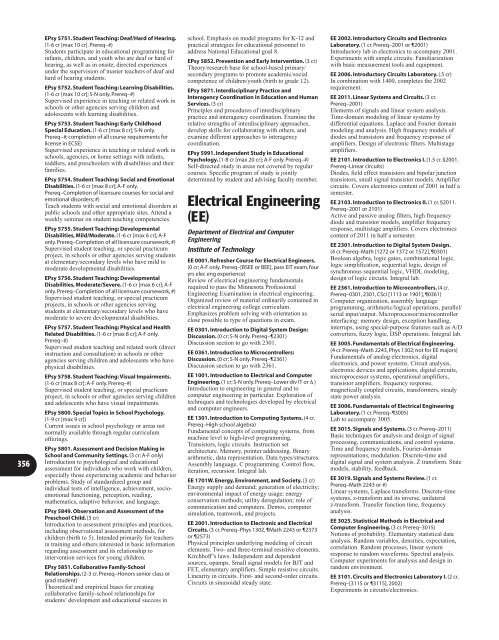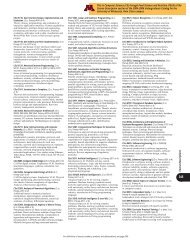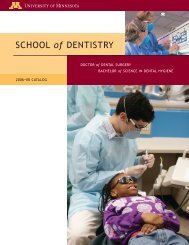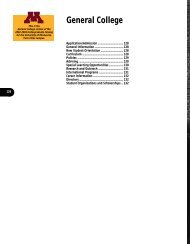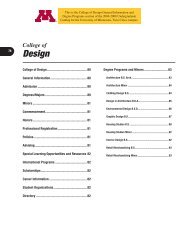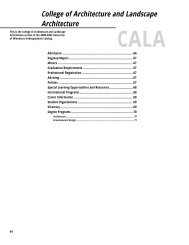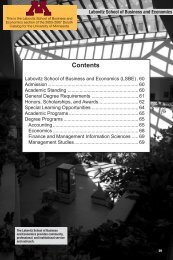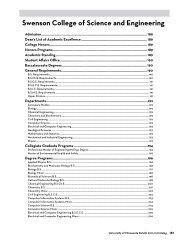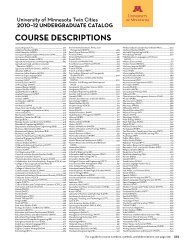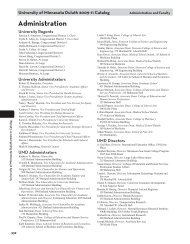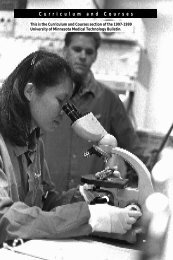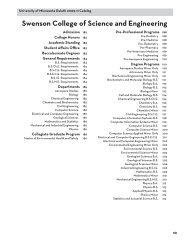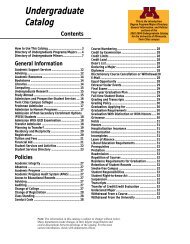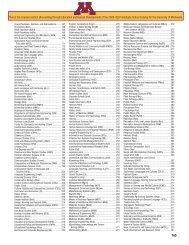EPsy 5612. Underst<strong>and</strong>ing of Academic Disabilities.(3 cr; A-F only)Introduction to issues related to the education ofstudents with academic disabilities (learningdisabilities, mild mental intellectual disabilities, <strong>and</strong>emotional/behavioral disabilities) including history,definition, assessment, classification, legislation, <strong>and</strong>intervention approaches.EPsy 5613. Foundations of Special Education I. (3 cr;A-F only. Prereq–Child development <strong>course</strong>, 5601 orequiv)Emphasis on the organization of educationalprograms <strong>and</strong> services for people with disabilities<strong>and</strong> their families. First <strong>course</strong> for students seekingto become licensed teachers in special education.EPsy 5614. Foundations of Special Education II.(3 cr; A-F only. Prereq–5613)Emphasis on assessment, planning, <strong>and</strong>implementing educational programs for people withdisabilities. Second <strong>course</strong> for students seeking tobecome licensed teachers in special education.EPsy 5615. Advanced Academic Interventions. (3 cr;A-F only. Prereq–5612)Develop knowledge <strong>and</strong> skills in designing,implementing, <strong>and</strong> evaluating Individual EducationalPlans (IEPs) for students eligible for specialeducation service in learning disabilities, emotional/behavioral disorders, <strong>and</strong> mild mental intellectualdisabilities.EPsy 5616. Behavior Analysis <strong>and</strong> ClassroomManagement. (3 cr)Introduction to assumptions, principles, <strong>and</strong>procedures of behavioral approach to analyzingbehavior <strong>and</strong> programs for classroom management.Emphasis on specifying problems, conductingobservations, intervening, <strong>and</strong> evaluating behavioralchange.EPsy 5621. Functional/Basic AcademicInterventions in Mental Retardation. (3 cr; A-F only.Prereq–5613, 5614)Methods <strong>and</strong> materials <strong>course</strong> emphasizingfunctional approaches to promoting academiclearning in students with mild to moderate mentalretardation <strong>and</strong> moderate to severe mentalretardation.EPsy 5622. Programs <strong>and</strong> Curricula for LearnersWith Severe Disabilities. (3 cr. Prereq–5616)Emphasis on developing programs <strong>and</strong> curricula forstudents with moderate, severe, <strong>and</strong> profounddevelopmental delays, as well as severemultih<strong>and</strong>icapping conditions. Special considerationgiven to preparing children <strong>and</strong> youth for integratedcommunity environments.EPsy 5624. Biomedical <strong>and</strong> Physical Aspects ofDevelopmental Disabilities. (2 cr; A-F only)Anatomy, physiology, <strong>and</strong> kinesthiology. Central/peripheral nervous system. Prenatal, perinatal, <strong>and</strong>postnatal development. Physically disablingconditions. Management/education procedures.EPsy 5625. Education of Infants, Toddlers, <strong>and</strong>Preschool Children With Disabilities: Introduction.(2 cr; A-F only)Overview of the issues, problems, <strong>and</strong> practicalapplications in designing early intervention servicesfor young children with disabilities <strong>and</strong> theirfamilies.EPsy 5626. Seminar: Developmental Disabilities <strong>and</strong>Instructional Management. (3 cr. Prereq–[5621, 5622]or #)Data-based strategies for school <strong>and</strong> nonschoolinstruction of learners with developmentaldisabilities including assessment, design,implementation, <strong>and</strong> evaluation of curriculum <strong>and</strong>instruction: curriculum content, concept <strong>and</strong> taskanalysis, classroom arrangements, natural <strong>and</strong>instructional cues, corrections, <strong>and</strong> consequences.EPsy 5635. Education of Students With Physical <strong>and</strong>Health Disabilities. (3 cr; A-F only. Prereq–5601 or #)Introduction to students with physical <strong>and</strong> healthdisabilities <strong>and</strong> their characteristics; the educationalimplications of physical disabilities; assessmentprocedures <strong>and</strong> appropriate educational interventionsfor learners with physical <strong>and</strong> health disabilities.EPsy 5636. Education of Multih<strong>and</strong>icappedLearners With Sensory Impairments. (2 cr.Prereq–5613, 5614)Characteristics of learners with visual <strong>and</strong> auditoryimpairments; design of instructional programs toremediate or circumvent disabilities, including use ofprosthetic devices; related areas of performanceaffected by sensory impairments.EPsy 5641. Foundations of Education for IndividualsWho Are Deaf/Hard of Hearing. (3 cr)Historical <strong>and</strong> current issues related to education ofindividuals who are deaf or hard of hearing.Implications of causes of hearing loss, social <strong>and</strong>cultural relationships, philosophies of education,characteristics <strong>and</strong> legislative guidelines <strong>and</strong> theirapplicability to education of individuals who are deafor hard of hearing.EPsy 5642. Early Childhood Intervention for Infants,Toddlers, <strong>and</strong> Preschoolers Who Are Deaf/Hard ofHearing. (3 cr. Prereq–Preservice teacher in deafeducation licensing program or #)Early identification/assessment. Family-centered,interdisciplinary servicing. Program development forinfants, toddlers, preschoolers who are deaf/hard ofhearing. Presentations, discussions, activities.EPsy 5644. Language Development <strong>and</strong>Programming for Deaf/Hard of Hearing Children.(3 cr)Comparative study of the development of functionallanguage in communicatively disabled <strong>and</strong>nondisabled individuals. Philosophies, programs, <strong>and</strong>practices focusing on the development of languagewith deaf <strong>and</strong> hard of hearing individuals. Models ofassessment <strong>and</strong> instruction for use in educationalsettings.EPsy 5646. Reading <strong>and</strong> Writing Practices WithDeaf/Hard of Hearing Children. (3 cr. Prereq–5644 orgeneral educ methods in tchg reading <strong>and</strong> writingskills, or #)Gain knowledge <strong>and</strong> skills to assess, plan, <strong>and</strong>implement instruction for children <strong>and</strong> youth withhearing loss. Emphasis is placed on research,theoretical, <strong>and</strong> programmatic issues in developingreading <strong>and</strong> writing skills, curricular adaptations, <strong>and</strong>effective instructional approaches.EPsy 5647. Aural <strong>and</strong> Speech Programming forPersons Who Are Deaf/Hard of Hearing. (3 cr)Study of the speech <strong>and</strong> hearing mechanisms, causesof hearing loss, <strong>and</strong> rehabilitation. Emphasis oninstructional practices, aural rehabilitation in theeducational setting, adaptive technology, <strong>and</strong>adaptations to optimize functional skills withindividuals who are deaf or hard of hearing.EPsy 5648. Communication Systems for ChildrenWith Disabilities. (2 cr)Applied study of assessment, selection, <strong>and</strong>application of alternative communication strategiesfor infants, children, <strong>and</strong> youth with disabilities.Emphasis on children with hearing loss <strong>and</strong>additional disabilities.EPsy 5649. Models of Instructional ProgrammingWith Deaf <strong>and</strong> Hard of Hearing Students. (3 cr.Prereq–[5641, 5644] or #)Design/development of portfolios for various modelsof educational service delivery systems forindividuals with hearing loss. Emphasizesconsultation skills, curriculum management/modifications, material/technology applications, <strong>and</strong>support service adaptations.EPsy 5656. Social <strong>and</strong> Interpersonal Characteristicsof Students With Disabilities. (3 cr; A-F only)Emphasis on children <strong>and</strong> youth of school age <strong>and</strong> onthe ways in which their emotional, social, <strong>and</strong>behavioral disorders affect their functioning inschool <strong>and</strong> on ways in which their behaviors disturbothers.EPsy 5657. Interventions for Social <strong>and</strong> EmotionalDisabilities. (3 cr; A-F only. Prereq–5616, 5656)Developing comprehensive behavioral programs forstudents with social <strong>and</strong> emotional disabilities.Instructing students with social <strong>and</strong> emotionaldisabilities.Course DescriptionsEPsy 5671. Literary Braille. (3 cr; A-F only)Mastery of literary braille code including allcontractions <strong>and</strong> short-form words used in Grade 2English Braille: American Usage. Use of specializedbraille writing equipment including, braille writer,slate <strong>and</strong> stylus, <strong>and</strong> computer programs with six-<strong>key</strong>input.EPsy 5672. Advanced Braille Codes. (2 cr; A-F only.Prereq–5671 or #)Mastery of the Nemeth code for braille mathematicstranscription including elementary mathcomputation, algebra, geometry, trigonometry, <strong>and</strong>symbolic logic notation. Introduction to foreignlanguages, computer notation, music, <strong>and</strong> raised linedrawing techniques.EPsy 5673. Reading <strong>and</strong> Writing for Children WithVisual Disabilities. (2 cr; A-F only. Prereq–5671, CI 5414or equiv, or #)Principles of preparation, selection, <strong>and</strong> use ofinstructional materials <strong>and</strong> adaptive technology forchildren with visual disabilities, including use ofbraille, large print, auditory tapes, <strong>and</strong> computer filesto access <strong>and</strong> electronically convert informationbetween these different media.EPsy 5674. Techniques of Orientation, Mobility, <strong>and</strong>Independence for Students With Visual Disabilities.(3 cr; A-F only. Prereq–5675 or #)Introduction to basic techniques to gain skills in precanetechniques, orientation to learningenvironments, <strong>and</strong> adaptations for activities of dailyliving <strong>and</strong> independence. Introduction to mobilitymaps, consideration of cane, guide dog, <strong>and</strong>telescopic aids to mobility.EPsy 5675. Structure <strong>and</strong> Function of the Eye:Educational Implications. (3 cr; A-F only)Anatomy <strong>and</strong> physiology of the eye <strong>and</strong> its relationto visual perception. Educational considerations forstudents with low vision studied in relation toophthalmologic <strong>and</strong> optometric evaluations <strong>and</strong>functional vision assessment.EPsy 5676. Case Management for Children WithVisual Disabilities. (3 cr; A-F only. Prereq–5671, 5673,5675)Advanced <strong>course</strong> evaluating <strong>and</strong> managing cognitive,psychosocial, physical, <strong>and</strong> academic needs ofstudents. Consideration of parent, teacher, <strong>and</strong>student in counseling <strong>and</strong> educational programmanagement.EPsy 5681. Education of Infants, Toddlers, <strong>and</strong>Preschool Children With Disabilities: Methods <strong>and</strong>Materials. (3 cr; A-F only. Prereq–5625)Overview of the methods <strong>and</strong> materials available tomaximize the developmental <strong>and</strong> educationaloutcomes for young children, birth to age 5, withdisabilities <strong>and</strong> their families in home, community,<strong>and</strong> school based-settings.EPsy 5701. Practicum: Field Experience in SpecialEducation. (1-6 cr [max 12 cr]; A-F only. Prereq–[5614,[FOE or SpEd grad or licensure student]] or #)Observations <strong>and</strong> supervised support of teachingpractice in schools or agencies serving children withdisabilities in integrated programs.EPsy 5720. Special Topics: Special Education. (1-4 cr[max 12 cr]. Prereq–#)Lab <strong>and</strong> fieldwork approach, often assuming aproduct orientation, e.g., generation of action plan,creating set of observation field notes, collecting datain some form. Provides opportunities for educationalpersonnel to study specific problems <strong>and</strong> possibilitiesrelated to special education.EPsy 5740. Special Topics: Interventions <strong>and</strong>Practices in Educational <strong>and</strong> Human ServicePrograms. (1-4 cr [max 8 cr]. Prereq–#)Concepts, issues, <strong>and</strong> practices related to thecommunity inclusion of children, youth, <strong>and</strong> adultswith developmental disabilities <strong>through</strong> weeklyseminar <strong>and</strong> extensive supervised experienceworking with individuals within the community.Course Descriptions355
356EPsy 5751. Student Teaching: Deaf/Hard of Hearing.(1-6 cr [max 10 cr]. Prereq–#)Students participate in educational programming forinfants, children, <strong>and</strong> youth who are deaf or hard ofhearing, as well as in onsite, directed experiencesunder the supervision of master teachers of deaf <strong>and</strong>hard of hearing students.EPsy 5752. Student Teaching: Learning Disabilities.(1-6 cr [max 10 cr]; S-N only. Prereq–#)Supervised experience in teaching or related work inschools or other agencies serving children <strong>and</strong>adolescents with learning disabilities.EPsy 5753. Student Teaching: Early ChildhoodSpecial Education. (1-6 cr [max 8 cr]; S-N only.Prereq–#; completion of all <strong>course</strong> requirements forlicense in ECSE)Supervised experience in teaching or related work inschools, agencies, or home settings with infants,toddlers, <strong>and</strong> preschoolers with disabilities <strong>and</strong> theirfamilies.EPsy 5754. Student Teaching: Social <strong>and</strong> EmotionalDisabilities. (1-6 cr [max 8 cr]; A-F only.Prereq–Completion of licensure <strong>course</strong>s for social <strong>and</strong>emotional disorders; #)Teach students with social <strong>and</strong> emotional disorders atpublic schools <strong>and</strong> other appropriate sites. Attend aweekly seminar on student teaching competencies.EPsy 5755. Student Teaching: DevelopmentalDisabilities, Mild/Moderate. (1-6 cr [max 6 cr]; A-Fonly. Prereq–Completion of all licensure <strong>course</strong>work, #)Supervised student teaching, or special practicumproject, in schools or other agencies serving studentsat elementary/secondary levels who have mild tomoderate developmental disabilities.EPsy 5756. Student Teaching: DevelopmentalDisabilities, Moderate/Severe. (1-6 cr [max 6 cr]; A-Fonly. Prereq–Completion of all licensure <strong>course</strong>work, #)Supervised student teaching, or special practicumprojects, in schools or other agencies servingstudents at elementary/secondary levels who havemoderate to severe developmental disabilities.EPsy 5757. Student Teaching: Physical <strong>and</strong> HealthRelated Disabilities. (1-6 cr [max 8 cr]; A-F only.Prereq–#)Supervised student teaching <strong>and</strong> related work (directinstruction <strong>and</strong> consultation) in schools or otheragencies serving children <strong>and</strong> adolescents who havephysical disabilities.EPsy 5758. Student Teaching: Visual Impairments.(1-6 cr [max 8 cr]; A-F only. Prereq–#)Supervised student teaching, or special practicumproject, in schools or other agencies serving children<strong>and</strong> adolescents who have visual impairments.EPsy 5800. Special Topics in School Psychology.(1-9 cr [max 9 cr])Current issues in school psychology or areas notnormally available <strong>through</strong> regular curriculumofferings.EPsy 5801. Assessment <strong>and</strong> Decision Making inSchool <strong>and</strong> Community Settings. (3 cr; A-F only)Introduction to psychological <strong>and</strong> educationalassessment for individuals who work with children,especially those experiencing academic <strong>and</strong> behaviorproblems. Study of st<strong>and</strong>ardized group <strong>and</strong>individual tests of intelligence, achievement, socioemotionalfunctioning, perception, reading,mathematics, adaptive behavior, <strong>and</strong> language.EPsy 5849. Observation <strong>and</strong> Assessment of thePreschool Child. (3 cr)Introduction to assessment principles <strong>and</strong> practices,including observational assessment methods, forchildren (birth to 5). Intended primarily for teachersin training <strong>and</strong> others interested in basic informationregarding assessment <strong>and</strong> its relationship tointervention services for young children.EPsy 5851. Collaborative Family-SchoolRelationships. (2-3 cr. Prereq–Honors senior class orgrad student)Theoretical <strong>and</strong> empirical bases for creatingcollaborative family-school relationships forstudents’ development <strong>and</strong> educational success inschool. Emphasis on model programs for K-12 <strong>and</strong>practical strategies for educational personnel toaddress National Educational goal 8.EPsy 5852. Prevention <strong>and</strong> Early Intervention. (3 cr)Theory/research base for school-based primary/secondary programs to promote academic/socialcompetence of children/youth (birth to grade 12).EPsy 5871. Interdisciplinary Practice <strong>and</strong>Interagency Coordination in Education <strong>and</strong> HumanServices. (3 cr)Principles <strong>and</strong> procedures of interdisciplinarypractice <strong>and</strong> interagency coordination. Examine therelative strengths of interdisciplinary approaches,develop skills for collaborating with others, <strong>and</strong>examine different approaches to interagencycoordination.EPsy 5991. Independent Study in EducationalPsychology. (1-8 cr [max 20 cr]; A-F only. Prereq–#)Self-directed study in areas not covered by regular<strong>course</strong>s. Specific program of study is jointlydetermined by student <strong>and</strong> advising faculty member.Electrical Engineering(EE)Department of Electrical <strong>and</strong> ComputerEngineeringInstitute of TechnologyEE 0001. Refresher Course for Electrical Engineers.(0 cr; A-F only. Prereq–[BSEE or BEE], pass EIT exam, fouryrs elec eng experience)Review of electrical engineering fundamentalsrequired to pass the Minnesota ProfessionalEngineering Examination in electrical engineering.Organized review of material ordinarily contained inelectrical engineering college curriculum.Emphasizes problem solving with orientation asclose possible to type of questions in exam.EE 0301. Introduction to Digital System Design:Discussion. (0 cr; S-N only. Prereq–2301)Discussion section to go with 2301.EE 0361. Introduction to Microcontrollers:Discussion. (0 cr; S-N only. Prereq–2361)Discussion section to go with 2361.EE 1001. Introduction to Electrical <strong>and</strong> ComputerEngineering. (1 cr; S-N only. Prereq–Lower div IT or ∆ )Introduction to engineering in general <strong>and</strong> tocomputer engineering in particular. Exploration oftechniques <strong>and</strong> technologies developed by electrical<strong>and</strong> computer engineers.EE 1301. Introduction to Computing Systems. (4 cr.Prereq–High school algebra)Fundamental concepts of computing systems, frommachine level to high-level programming.Transistors, logic circuits. Instruction setarchitecture. Memory, pointer addressing. Binaryarithmetic, data representation. Data types/structures.Assembly language, C programming. Control flow,iteration, recursion. Integral lab.EE 1701W. Energy, Environment, <strong>and</strong> Society. (3 cr)Energy supply <strong>and</strong> dem<strong>and</strong>; generation of electricity;environmental impact of energy usage; energyconservation methods; utility deregulation; role ofcommunication <strong>and</strong> computers. Demos, computersimulation, teamwork, <strong>and</strong> projects.EE 2001. Introduction to Electronic <strong>and</strong> ElectricalCircuits. (3 cr. Prereq–Phys 1302, Math 2243 or 2373or 2573)Physical principles underlying modeling of circuitelements. Two- <strong>and</strong> three-terminal resistive elements,Kirchhoff’s laws. Independent <strong>and</strong> dependentsources, opamps. Small signal models for BJT <strong>and</strong>FET, elementary amplifiers. Simple resistive circuits.Linearity in circuits. First- <strong>and</strong> second-order circuits.Circuits in sinusoidal steady state.EE 2002. Introductory Circuits <strong>and</strong> ElectronicsLaboratory. (1 cr. Prereq–2001 or 2001)Introductory lab in electronics to accompany 2001.Experiments with simple circuits. Familiarizationwith basic measurement tools <strong>and</strong> equipment.EE 2006. Introductory Circuits Laboratory. (.5 cr)In combination with 1400, completes the 2002requirement.EE 2011. Linear Systems <strong>and</strong> Circuits. (3 cr.Prereq–2001)Elements of signals <strong>and</strong> linear system analysis.Time-domain modeling of linear systems bydifferential equations. Laplace <strong>and</strong> Fourier domainmodeling <strong>and</strong> analysis. High frequency models ofdiodes <strong>and</strong> transistors <strong>and</strong> frequency response ofamplifiers. Design of electronic filters. Multistageamplifiers.EE 2101. Introduction to Electronics I. (1.5 cr. §2001.Prereq–Linear circuits)Diodes, field effect transistors <strong>and</strong> bipolar junctiontransistors, small signal transistor models. Amplifiercircuits. Covers electronics content of 2001 in half asemester.EE 2103. Introduction to Electronics II. (1 cr. §2011.Prereq–2001 or 2101)Active <strong>and</strong> passive analog filters, high frequencydiode <strong>and</strong> transistor models, amplifier frequencyresponse, multistage amplifiers. Covers electronicscontent of 2011 in half a semester.EE 2301. Introduction to Digital System Design.(4 cr. Prereq–Math [1272 or 1372 or 1572], 0301)Boolean algebra, logic gates, combinational logic,logic simplification, sequential logic, design ofsynchronous sequential logic, VHDL modeling,design of logic circuits. Integral lab.EE 2361. Introduction to Microcontrollers. (4 cr.Prereq–0301, 2301, CSci [1113 or 1901], 0361)Computer organization, assembly languageprogramming, arithmetic/logical operations, parallel/serial input/output. Microprocessor/microcontrollerinterfacing: memory design, exception h<strong>and</strong>ling,interrups, using special-purpose features such as A/Dconverters, fuzzy logic, DSP operations. Integral lab.EE 3005. Fundamentals of Electrical Engineering.(4 cr. Prereq–Math 2243, Phys 1302; not for EE majors)Fundamentals of analog electronics, digitalelectronics, <strong>and</strong> power systems. Circuit analysis,electronic devices <strong>and</strong> applications, digital circuits,microprocessor systems, operational amplifiers,transistor amplifiers, frequency response,magnetically coupled circuits, transformers, steadystate power analysis.EE 3006. Fundamentals of Electrical EngineeringLaboratory. (1 cr. Prereq–3005)Lab to accompany 3005.EE 3015. Signals <strong>and</strong> Systems. (3 cr. Prereq–2011)Basic techniques for analysis <strong>and</strong> design of signalprocessing, communications, <strong>and</strong> control systems.Time <strong>and</strong> frequency models, Fourier-domainrepresentations, modulation. Discrete-time <strong>and</strong>digital signal <strong>and</strong> system analysis. Z transform. Statemodels, stability, feedback.EE 3019. Signals <strong>and</strong> Systems Review. (1 cr.Prereq–Math 2243 or #)Linear systems, Laplace transforms. Discrete-timesystems, z-transform <strong>and</strong> its inverse, unilateralz-transform. Transfer function time, frequencyanalysis.EE 3025. Statistical Methods in Electrical <strong>and</strong>Computer Engineering. (3 cr. Prereq–3015)Notions of probability. Elementary statistical dataanalysis. R<strong>and</strong>om variables, densities, expectation,correlation. R<strong>and</strong>om processes, linear systemresponse to r<strong>and</strong>om waveforms. Spectral analysis.Computer experiments for analysis <strong>and</strong> design inr<strong>and</strong>om environment.EE 3101. Circuits <strong>and</strong> Electronics Laboratory I. (2 cr.Prereq–[3115 or 3115], 2002)Experiments in circuits/electronics.


